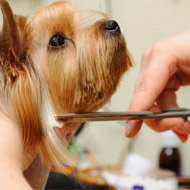Many owners uninformed about dog grooming, survey finds

73 per cent of dog groomers see breeds coming into their salon in an 'all poor' or 'mostly poor' condition.
Many owners are uninformed about the importance of dog grooming, according to a recent poll, meaning that groomers are faced with dealing with the very real welfare problems this can cause.
The British Dog Groomers' Association (BDGA) Grooming Survey, the first of its kind, has revealed that 73 per cent of dog groomers see breeds coming into their salon in an 'all poor' or 'mostly poor' condition with matts and knots.
The majority of respondents felt that owners hadn't done enough research before purchasing a dog, with some even being told by breeders that their dog didn't need grooming.
"Dog grooming plays such an important role in keeping a dog happy and health, commented BDGA chair Stuart Simmons.
He adds: "Apart from keeping the coat clean and free from matts, which can cause skin complaints if left, regular grooming also helps improve circulation, keeps grease levels down which can cause cysts and also allows dog groomers to do a quick health check and help to spot any early signs of illness. It’s so much more than hairdressing for dogs!"
The survey also revealed a surge in the popularity of 'designer' dogs, with poodle cross-breeds now amongst the most popular types of dog seen in the nation's dog grooming salons.
The shih-tzu was the most popular named pedigree breed, with the cocker spaniel following closely behind.
The survey findings will be used by the BDGA and its umbrella body, the Pet Industry Federation, to help inform groomer training. The figures will aid discussions with education bodies and influential groups to highlight the important role that dog groomers have in maintaining the health and welfare of dogs.
To download a full report of the survey, visit www.petfederation.co.uk



 The latest
The latest